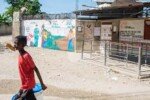UNITED NATIONS, March 29: Haiti now needs between 4,000 and 5,000 international police to help tackle “catastrophic” gang violence which is targeting key individuals and hospitals, schools, banks and other critical institutions, the U.N. rights expert for the conflict-wracked Caribbean nation said Thursday.
Last July, William O’Neill said Haiti needed between 1,000 and 2,000 international police trained to deal with gangs. Today, he said the situation is so much worse that double that number and more are needed to help the Haitian National Police regain control of security and curb human rights abuses.
O’Neill spoke at a news conference launching a U.N. Human Rights Office report he helped produce which called for immediate action to tackle the “cataclysmic” situation in Haiti where corruption, impunity and poor governance compounded by increasing gang violence have eroded the rule of law and brought state institutions “close to collapse.”
The report, covering the five-month period ending in February, said gangs continue to recruit and abuse boys and girls, with some children being killed for trying to escape.
Gangs also continue to use sexual violence “to brutalize, punish and control people,” the report said, citing women raped during gang attacks in neighborhoods, “in many cases after seeing their husbands killed in front of them.”
In 2023, the number of people killed and injured as a result of gang violence increased significantly – with 4,451 killed and 1,668 injured, the report said. And up to March 22 this year, the numbers skyrocketed to 1,554 killed and 826 injured.
As a result of the escalating gang violence, so-called “self-defense brigades” have taken justice into their own hands, the report said, and “at least 528 cases of lynching were reported in 2023 and a further 59 in 2024.”
The human rights report reiterated the need for urgent deployment of a multinational security mission to help Haiti’s police stop the violence and restore the rule of law. And it urged tighter national and international controls to stem the trafficking of weapons and ammunition to gangs and others – much of it from the United States.
O’Neill, who was appointed by the Geneva-based U.N. human rights chief, said the “alarming” targeting of key institutions and individuals began in the last four or five weeks – with 18 attacks on hospitals documented, attacks on schools including one set on fire three days ago, and one of Haiti’s elite academic institutions set ablaze on Wednesday night. Gangs have also stormed Haiti’s two biggest prisons.
In addition, he said, gangs have made two attempts to take control of the National Palace, and they are targeting human rights defenders, journalists and people they see as threats to their continuing control of territory.
Another new element documented by the U.N. human rights team in Haiti, O’Neill said, is the use of children not only as messengers, lookouts, sex slaves and cooks, but young teenagers are now involved in frontline activities and attacks in numbers not seen before.
The closure of the airport and roads has also left about 1.4 million Haitians on the verge of famine. And the number of people fleeing their homes has increased from 50,000 last July according to the U.N. International Organization for Migration to at least 362,000, “and I would say given the last three to four weeks, we’re probably close to 400,000 if not over that,” the U.N. envoy said.
O’Neill said re-establishing security is key, and getting the international security force on the ground in Haiti is critical and urgent.
Getting the transitional presidential council officially installed and active is also “crucial” and “absolutely vital,” O’Neill said, expressing hope this could happen possibly next week. For one thing, Kenya’s President William Ruto has said he won’t deploy police to lead the multinational security operation until he has a Haitian counterpart, the U.N. expert said.
O’Neill said the trust fund to finance the international police operation also desperately needs funds.
Haiti asked for an international force to combat gangs in October 2022, and U.N. Secretary-General Antonio Guterres appealed for a force last July, he said.
“We’re still waiting and every day lost means more people die, and more women and girls get raped, and more people flee their homes,” O’Neill said. “So the sooner the better.” (AP)












